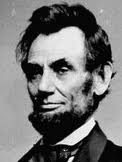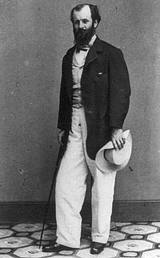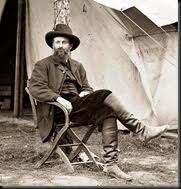 Lincoln’s Stealthy Operative and Media Manipulator Extraordinaire, had not only been managing editor of the New York Tribune, but also was a master of military and political intrigues during the Civil War. President Lincoln’s toughest job was to sift intelligently through all the different communiques, telegrams and letters, determining which were mainly self-serving opinion and which were based on factual, worthwhile reasoning. Lincoln had several key advisors that kept him informed and helped screen and winnow out the superfluous information, but the President trusted the non-biased opinion of the former media editor and eventually Stanton’s Assistant Secretary of War, Charles A. Dana.
Lincoln’s Stealthy Operative and Media Manipulator Extraordinaire, had not only been managing editor of the New York Tribune, but also was a master of military and political intrigues during the Civil War. President Lincoln’s toughest job was to sift intelligently through all the different communiques, telegrams and letters, determining which were mainly self-serving opinion and which were based on factual, worthwhile reasoning. Lincoln had several key advisors that kept him informed and helped screen and winnow out the superfluous information, but the President trusted the non-biased opinion of the former media editor and eventually Stanton’s Assistant Secretary of War, Charles A. Dana.
 Charles Anderson Dana, was born in 1819 and was a native of New Hampshire. He enrolled at Harvard in 1839 and left in 1841. After a tour of several minor publications, Dana joined the staff of the New York Tribune in 1847 and for two years traveled through Europe, writing articles for the Tribune and other periodicals. While abroad, reporting on the various revolutions of the day, the impressionable 28-year-old made the acquaintance of Karl Marx, who wrote for the New York Daily Tribune, from 1852-1861. Returning to the States, in 1849, Managing Editor Horace Greeley, recognized in Dana the possibilities of a second in command, they had similar ideals and philosophy’s regarding abolition and politics. Greeley made Dana a proprietor and managing editor of the Tribune and for the next ten years, circulation soared, the Tribune became the leading publication for the anti-slavery faction, it’s political and public persuasion was a powerful influence over the Eastern elite.
Charles Anderson Dana, was born in 1819 and was a native of New Hampshire. He enrolled at Harvard in 1839 and left in 1841. After a tour of several minor publications, Dana joined the staff of the New York Tribune in 1847 and for two years traveled through Europe, writing articles for the Tribune and other periodicals. While abroad, reporting on the various revolutions of the day, the impressionable 28-year-old made the acquaintance of Karl Marx, who wrote for the New York Daily Tribune, from 1852-1861. Returning to the States, in 1849, Managing Editor Horace Greeley, recognized in Dana the possibilities of a second in command, they had similar ideals and philosophy’s regarding abolition and politics. Greeley made Dana a proprietor and managing editor of the Tribune and for the next ten years, circulation soared, the Tribune became the leading publication for the anti-slavery faction, it’s political and public persuasion was a powerful influence over the Eastern elite.
The Dana-Greeley match was difficult and lasted for 13 years. As historian Janet Steele wrote,
“Like Greeley, Dana was ambitious, stubborn, vain and an opportunist. Though Dana understood from the start that he could advance his career by an association with the Tribune, the benefits of the arrangement were far from one-sided. Horace Greeley, aware of his own limitations as a manager, recognized the need for a lieutenant able to direct the daily operations of the paper. In Dana he believed he had found his man.”
In 1862, citing management differences, the board of managers of the Tribune asked for and received Charles Dana’s resignation. President Lincoln heard that Dana was at loose ends and directed Secretary of War Stanton, to recruit him immediately, to a post in the administration. Stanton on Lincoln’s direction, appointed Dana, Assistant Secretary of War, a position that was soon rescinded by Stanton after the appointment was leaked to the eastern press. The President still needed Dana as an emissary at large, that could report first hand, on rumors and innuendo, that influenced policy and military promotion. Dana still maintained his contacts with the eastern press and strategically released information regarding his favorites in command and politics. James Harrison Wilson, a Dana biographer wrote,
 “As a journalist and an advisor to President Lincoln, Mr. Dana was one of the most influential men of his time. Weighed for the strength and variety of his faculties, and for his power to interest and impress men’s minds, he must be
“As a journalist and an advisor to President Lincoln, Mr. Dana was one of the most influential men of his time. Weighed for the strength and variety of his faculties, and for his power to interest and impress men’s minds, he must be
considered as the first of American editors. Yet it happened that in the great era of the Civil War his energies were so powerfully called upon, and his services were so vigorous and effective, that he must also be classed among the real heroes of that unequalled conflict. By his pen no less that by his official action, he exerted a tremendous influence upon both the men and measures of his
day. As field correspondent, and assistant to Stanton, he was potent in deciding the fate of leading generals as well as in shaping the military policies of the Administration.”
In 1864, Lincoln had to deal with the issue of Nevada’s admission to statehood and Dana wrote,
“For a long time beforehand the question had been canvassed anxiously. At last, late one afternoon, the president came into my office, in the third story of the War Department. He used to come there sometimes rather than send for me, because he was fond of walking and liked to get away from the crowds in the White House. He came in and shut the door.
‘Dana,’ he said, ‘I am very anxious about this vote. It has got to be taken next week. The time is very short. It is going to be a great deal closer than I wish it was.’
“There are plenty of Democrats who will vote it,’ I replied. There is James E. English, of Connecticut; I think he is sure, isn’t he?’
‘Oh, yes; he is sure on the merits of the question.’
‘Then,’ said I, ‘there’s ‘Sunset’ Cox, of Ohio. How is he?’
‘He is sure and fearless. But there are some others that I am not clear about. There are three that you can deal with better than anybody else, perhaps, as you know them all. I wish you would send for them.’
He told me who they were; it isn’t necessary to repeat the names here. One man was from New Jersey and two from New York. ‘What will they be likely to want?’ I asked.
‘I don’t know,’ said the President; ‘I don’t know. It makes no difference, though, what they want. Here is the alternative: that we carry this vote, or be compelled to raise another million, and I don’t know how many more, men, and fight no one knows how long. It is a question of three votes or new armies.
‘Well, sir, said I, what shall I say to these gentlemen?’
‘I don’t know,’ said he; ‘but whatever promise you make to them I will perform.”
I sent for the men and saw them one by one. I found that they were afraid of their party. They said that some fellows in the party would be down on them. Two of them wanted internal revenue collector’s appointments. ‘You shall have it,’ I said.
Another one wanted a very important appointment about the custom-house of New York. I knew the man well whom he wanted to have appointed. He was a Republican, though the congressman was a Democrat. I had served with him in the Republican county committee of New York. The office was worth perhaps twenty thousand dollars a year. When the congressman stated the case, I asked him, ‘Do you want that?’ ‘Yes,’ said he. ‘Well, I answered, ‘you shall have it.’
‘I understand, of course,’ said he, ‘that you are not saying this on your own authority?” ‘Oh, no,’ said I; “I am saying it on the authority of the President.”
“Well, these men voted that Nevada be allowed to form a State government, and thus they helped secure the vote which was required. The next October the President signed the proclamation admitting the State. In the February following Nevada was one of the States which ratified the Thirteenth Amendment, by which slavery was abolished by constitutional prohibition in all of the United States. I have always felt that this little piece of side politics was one of the most judicious, humane, and wise uses of executive authority that I have ever assisted in or witnessed.”
Charles Anderson Dana was not only a great admirer of Lincoln, but thoroughly enjoyed the position of trust and authority that the President bestowed on him. There was a satisfaction gained by being more than Greeley’s boy, a legacy as Lincoln’s Stealthy Operative and Media Manipulator Extraordinaire.
Bummer


So there’s only one degree of separation between Karl Marx and Abraham Lincoln? That’s a new one on me. Had Lincoln met Dana before Greeley sacked him? It sounds like a mighty leap of faith for the president to see a newspaperman in such a critical military position.
Louis,
Dana’s background, in his youth, included 5 years as trustee at a communal compound in New Hampshire. When he met Marx in Europe, they both had similar social philosophies. Dana was managing Editor at the Tribune for ten years and supported Lincoln as an anti-slavery candidate. Lincoln put a lot of store in aggressive, idealistic young men and he and Dana shared the same goals regarding government policy, social reform and leadership style. Dana also had maintained most of his media contacts and could shape public perception through strategic press releases.
Bummer